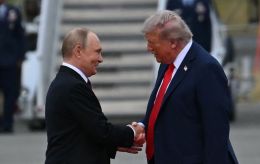Not Georgian dream: Why Tbilisi is protesting and whether there are prospects of political changes
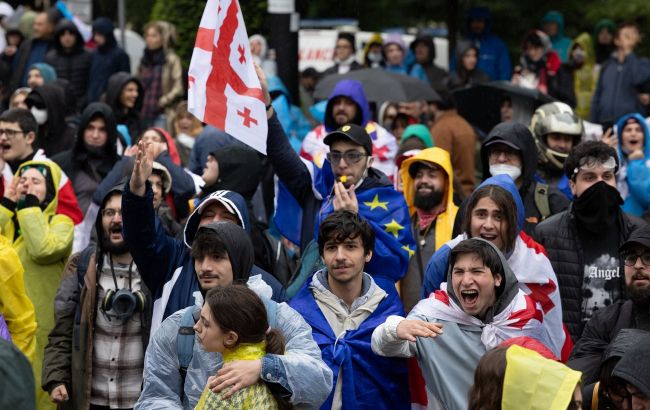 Why Georgia is protesting against the law on foreign agents (photo: Getty Images)
Why Georgia is protesting against the law on foreign agents (photo: Getty Images)
Despite massive protests in Tbilisi, the Georgian parliament finally approved the controversial law on foreign agents. The document, which is a copy of the Russian law, threatens to restrict the rights and freedoms of Georgian media and non-governmental organizations, as well as Georgia's path to the EU and NATO. Why did the Georgian authorities take this step, what can this mean for Georgia, and whether the protests will escalate into a change of government - read in the RBC-Ukraine article.
Sources: Echo of the Caucasus, News Georgia, Georgia Online, BBC, Georgian and Western politicians, Georgian MP Khatia Dekanoidze, and Georgian political scientist Gela Vasadze.
Contents
- Situation in Georgia
- Foreign agents law
- EU and US reaction to situation in Georgia and Russia's interest
- Can protests in Georgia lead to change of government
Situation in Georgia
This April, the Georgian parliament took up consideration of the law on foreign agents. This is not the first attempt by the ruling Georgian Dream party, founded by pro-Russian billionaire Bidzina Ivanishvili, to push through this law, but this time it managed to bring the document to a conclusion.
The story of this scandalous law goes back to last year's spring. Back then, after the document was approved in the first reading, protests broke out in Georgia, which were immediately dispersed by security forces. President Salome Zurabishvili sided with the protesters, promising to veto the law if the parliament finally approved it.
After two tense days on the streets of Tbilisi, the Georgian parliament backtracked and rejected the law in the second reading after the Georgian Dream withdrew it. But already this spring, the Georgian authorities returned to the scandalous law, quickly passing the document in two readings, which again sparked mass protests.
The Georgian parliament also had a heated debate on the law. Voting in the second and third readings was accompanied by fights between parliamentarians. But in the end, this did not prevent the final approval.
Foreign agents law
Critics of the Georgian law on foreign agents call it Russian. And for good reason. Although its authors claimed that it was based on the American law FARA (which was approved in 1938 to counter Nazi propaganda in the United States), the document is similar to its Russian version.
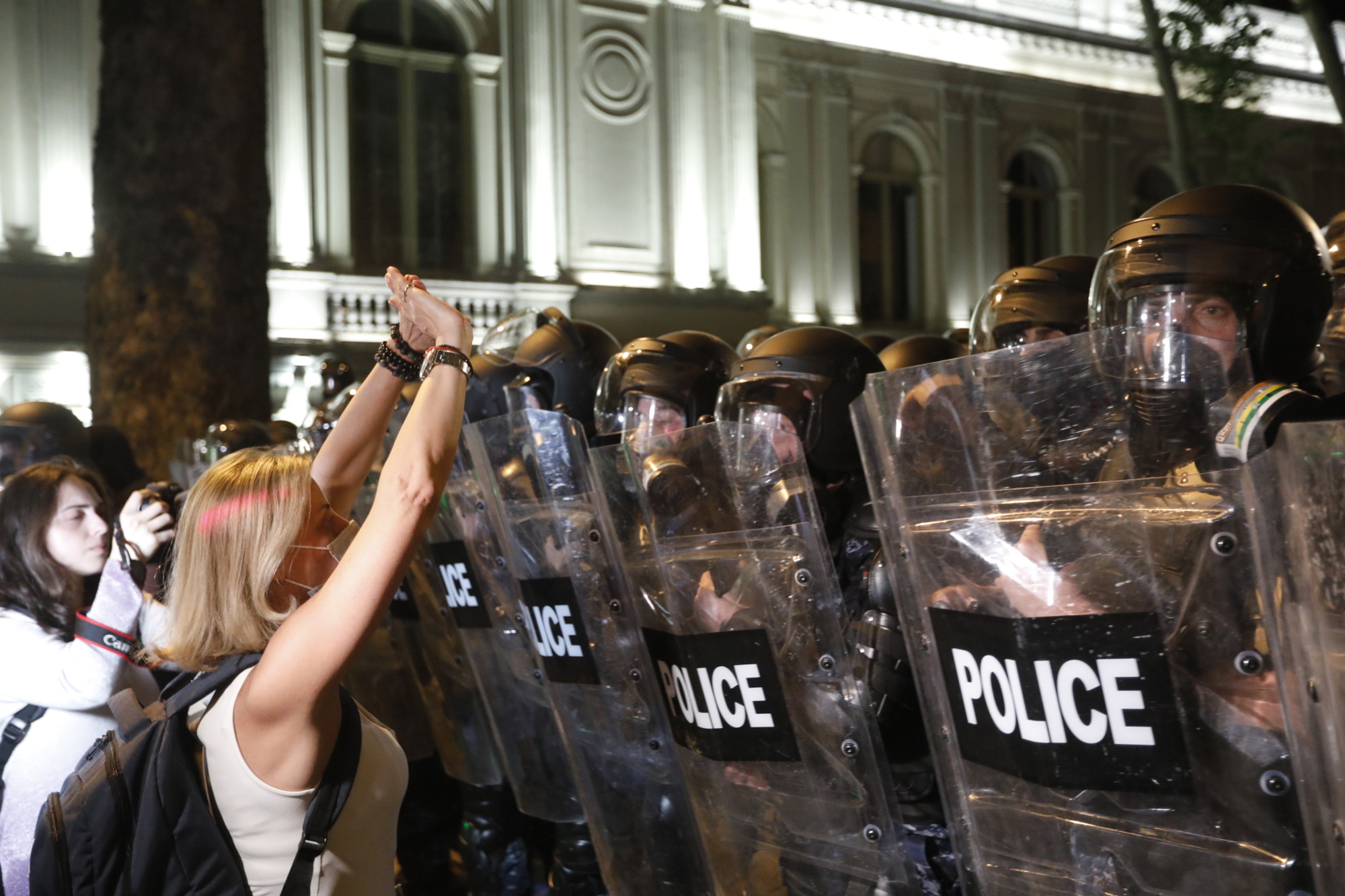
Protests in Georgia over the scandalous law on foreign agents (Photo: Getty Images)
Thus, the law on foreign agents stipulates that non-governmental organizations and media outlets with foreign funding of more than 20% of their annual income must register and obtain the status of agent of foreign influence. The vast majority of Georgian media and non-governmental organizations that work primarily with Western funds will fall under this brush.
So-called foreign agents will have to fill out public financial declarations and will face a fine of 25,000 GEL (more than $9,000) for evading the law.
Moreover, the Georgian Ministry of Justice will be able to monitor media and organizations at any time to identify so-called foreign agents and obtain various information, including personal data.
The Georgian Dream claimed that the law was needed for transparency and accountability, and accused NGOs of preparing a revolution, but critics believe that the document will serve as a tool for pressure and repression of dissidents.
According to Georgian oppositionist Khatia Dekonoidze, the law is backed by the founder of the Georgian Dream, Ivanishvili, who wants to deprive independent media and NGOs of influence ahead of the parliamentary elections.
"But the most important thing for you to understand is that the government in Georgia does not decide anything, it is Ivanishvili and his proteges who decide everything. And the most important thing is that we get to the elections, democratic elections without this law. Because if this law is passed, it means that Ivanishvili wants to eliminate all civil society, all NGOs," she says in a blitz interview with RBC-Ukraine.
EU and US reaction to situation in Georgia and Russia's interest
In the West, the Georgian authorities' desire to pass a law on foreign agents was met with sharp criticism. Even after the first reading, the head of European diplomacy, Josep Borrell, and the European Commissioner for Neighborhood and Enlargement, Oliver Varghese, issued a joint statement warning Tbilisi of the problems on the way to the EU that could arise after the approval of this document.
"This is a very disturbing development, and the final adoption of the law will harm Georgia's progress towards the EU. The law will limit the capacity of civil society and the media, may restrict freedom of expression, and unfairly stigmatize organizations that benefit Georgian citizens," Borrel and Varghese emphasize.
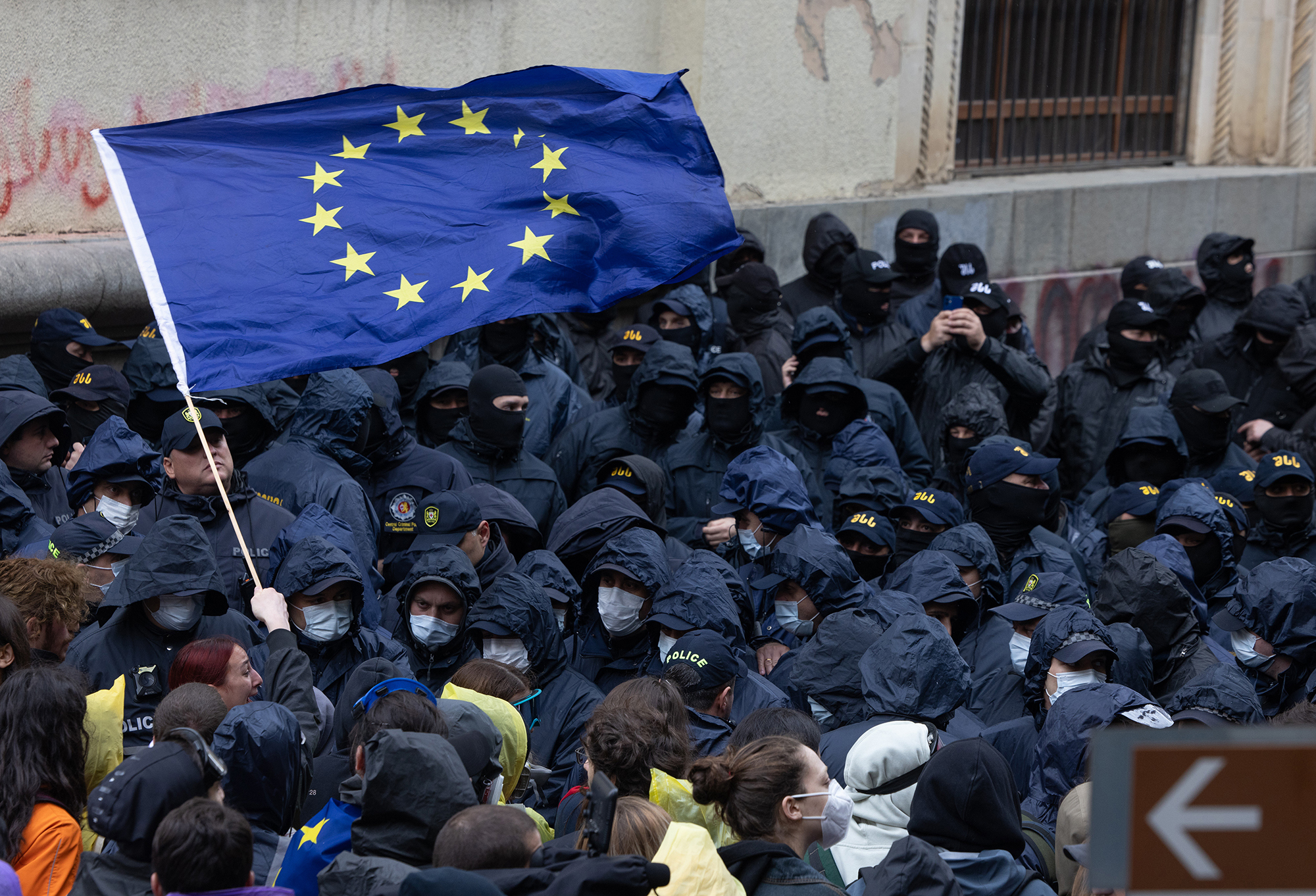
The West does not support the Georgian law on foreign agents (Photo: Getty Images)
The idea of the Georgian Dream was also criticized in the European Parliament. MEPs supported a resolution calling for not starting negotiations on Georgia's accession to the EU if the law is approved. There were even proposals among MEPs to revoke Georgia's status as a candidate for EU membership.
Reacting to the criticism, the head of the Georgian Dream party, Irakli Garibashvili, says that the Georgian government is ready to repeal or revise the scandalous law if Brussels invites Georgia to join the EU.
"If we are told that tomorrow we will become a member of the European Union, it will be very easy to cancel, revise, rework, or adopt a new law," says the head of the Georgian Dream, emphasizing that Georgia's European integration process stopped last year due to the EU's unwillingness to expand.
NATO also criticizes the law, calling it a step backward on Georgia's path to Euro-Atlantic integration. The NATO Secretary General's Special Representative for the Caucasus and Central Asia, Javier Colomina, emphasizes that ensuring media freedom is an important condition for NATO membership.
The situation with this law has significantly impacted Tbilisi's relations with Washington. In early May, the American ambassador to Georgia, Robin Dunnigan, said that the Georgian Prime Minister had refused an official invitation to fly to Washington. In an official statement, the Georgian Ministry of Foreign Affairs explained Kobakhidze's refusal because Washington allegedly demanded that the Georgian parliament temporarily suspend consideration of the law on foreign agents.
"Conducting a visit with reservations does not correspond to the spirit of partnership, which should be based on mutual respect and mutual trust, and a detailed explanation was provided to the US Ambassador," the Foreign Ministry said.
And this week, the founder of the Georgian Dream, Ivanishvili, refused to meet with US Assistant Secretary of State James O'Brien, who arrived in Tbilisi. This is not the first time Ivanishvili has refused to meet with European and American politicians and diplomats. These refusals are explained by blackmail and de facto sanctions of the party of global war.
This refers to Ivanishvili's $2 billion in assets that the Swiss bank Credit Suisse froze after Russia's full-scale invasion of Ukraine. The reason for the freezing of Ivanishvili's assets was suspicions that they might be linked to Russia. Therefore, Ivanishvili's main condition for the meetings is to unblock this money. In his turn, O'Brien, after the final adoption of the bill, threatened to suspend financial assistance to Georgia and impose personal sanctions.
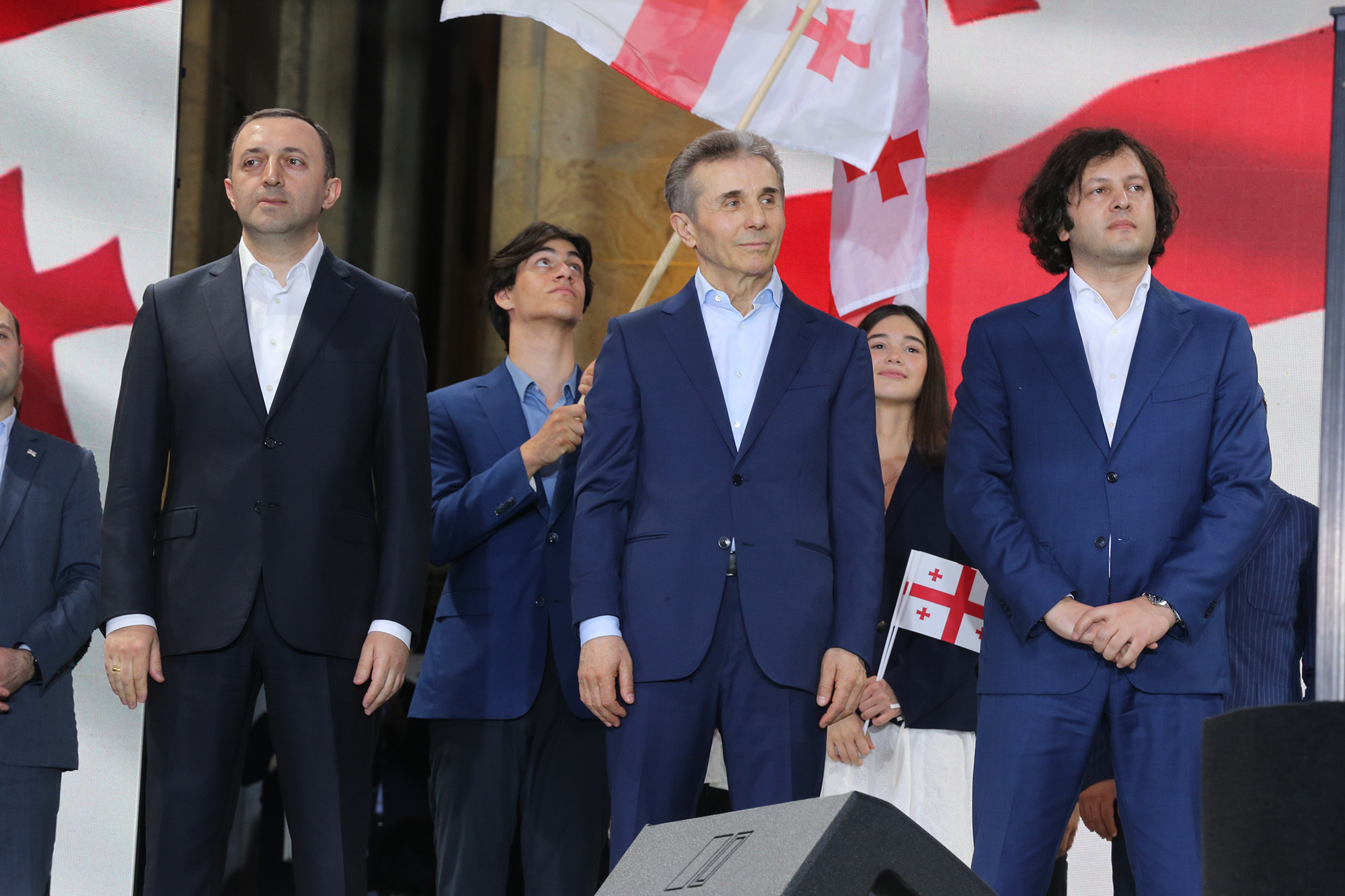 The leadership of the Georgian Dream ignores meetings with Western politicians and diplomats (Photo: Getty Images)
The leadership of the Georgian Dream ignores meetings with Western politicians and diplomats (Photo: Getty Images)
According to Georgian political scientist Gela Vasadze, Ivanishvili harbors a grudge against the West, and the Russians have twisted him with fabrications that the West is also preparing a change of power in Georgia. And this may have something to do with the Georgian authorities' insistence on approving the scandalous law.
"Ivanishvili is sure that there is a conspiracy against him, that he is going to be overthrown. He is not going to put it in reverse, but some bargaining is possible. But this is purely a tactical bargaining: let's accept it, and then we'll talk. But in general, the real point is to return the 2 billion and not try to overthrow him. These are the specific messages that have been voiced to the West," Vasadze explains in a commentary to RBC-Ukraine.
At the same time, according to the political scientist, if the West refuses to accept his terms, Ivanishvili is threatening to change his foreign policy course. This, according to Vasadze, will not mean hanging Russian flags but will affect, for example, Georgia's trade ties with the West and the East.
"A change of course is, for example, the construction of the Chinese port of Anaklia or a railroad. This is a change of course. A change of course is a quiet boycott of the development of east-west corridors and support for north-south corridors. It's very simple, really," the political scientist tells the agency.
Oppositionist Dekonoidze is sure that Russians are Ivanishvili's strategic advisors in this situation, and she does not rule out the involvement of Russian agents who have arrived in Georgia. Vasadze also admits that Russia is interested in the fact that Georgia may change its external vector, as Moscow has lost its influence in the region due to the war against Ukraine.
"And not only in the region. You see, in the west, everything is blocked. Russia is under a logistical blockade, its value for China is rapidly declining, and with the return of the South Caucasus, it is regaining Chinese transit. So it's not about the region, the price is much higher. For Russia, this is the price of survival. Because if they are cut off in the South Caucasus as well, then Russia's prospects will be very, very doubtful," the political scientist adds.
Can protests in Georgia lead to change of government
The protests that erupted in April over the law on foreign agents are still going on in Georgia. This weekend, according to the Visioner fact-checking project, Tbilisi hosted the largest anti-government protest in Georgian history. At least 200,000 people took to the streets of Tbilisi on Saturday evening, and the total number of protesters throughout the day was approaching 300,000, which is about 10% of Georgia's population.
"I think the protests will continue, they are growing. Today all the institutes and universities have joined the protest, students came out in Batumi, Kutaisi, and other cities. And this is very important news because students have never protested so massively before," Dekanoidze says in an interview with RBC-Ukraine.
 The largest protest in Georgian history took place in Tbilisi (Photo: Getty Images)
The largest protest in Georgian history took place in Tbilisi (Photo: Getty Images)
However, the Georgian protests have no leaders, neither among politicians nor the public. According to Dekanoidze, such a horizontal protest has its advantages, as the authorities could easily discredit a particular protest leader. And, according to the oppositionist, it is important to keep the protest in this form.
Today, there is no revolutionary sentiment among Georgians, and the protests are more of a peaceful action. Despite the crackdown on protests by security forces, which are often accompanied by water cannons, tear gas, and rubber bullets, Georgian protesters are not moving towards violent confrontation and the overthrow of the Georgian Dream government.
However, as Vasadze notes in an interview with RBC-Ukraine, the revolutionary scenario is always present in countries with underdeveloped democratic trends, and Georgia is no exception. But the political scientist refused to make any predictions, although he notes that the revolutionary scenario would be a full merit of the ruling party.
"Our protests are peaceful. Therefore, all responsibility lies with the government," Dekanoidze says in an interview with RBC-Ukraine.
The parliamentary elections in October will likely decide whether the government will change in Georgia. The situation with the law on foreign agents has undoubtedly shaken the position of the Georgian Dream ruling party, Dekanoidze and Vasadze believe.
According to the political scientist, previously about 70% of Georgian voters were inert and did not support either the government or the opposition, but this year most of them are ready to go to the polls. And if the elections were held today, according to Vasadze, they would vote for any opposition.
"For someone from the opposition. It doesn't matter who. And I call all the talks about the need for the opposition to unite wrong honey. I believe that there is no need for the opposition to unite. The opposition should go to the polls as separate partisan groups and bring their voters," he says.
Yesterday, Georgians again protested in the center of Tbilisi and are likely to continue to do so, as the story of the law on foreign agents is not yet over. President Zurabishvili promised to reject the scandalous document after the third reading, but the parliament has a constitutional mechanism to override the veto.
This story may drag on throughout June and be accompanied by protests. Although the protesters do not have a clear plan and the Georgian opposition lacks unity, the protest potential among Georgians is quite high.

